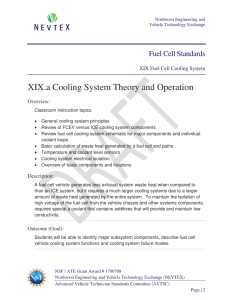Fuel Cell Standards: Fuel Cell Cooling Systems

Fuel Cell Standards Curriculum Description:
The Fuel Cell Standards curriculum is provided by the Northwest Engineering and Vehicle Exchange (NEVTEX) and developed by Central Oregon Community College (COCC) and Rio Hondo College (RHC). COCC and RHC worked together "to develop curriculum and training standards for technicians in hybrid electric vehicle (HEV), electric vehicle (EV), and Fuel Cell (FC) vehicle systems." This curriculum was developed with the intention of addressing industry needs by partnering with industrial and educational representatives to obtain input and assistance to develop:
- new approaches to prepare an advanced technologies workforce,
- licensure procedures and policies to ensure the safety of technicians, their employers, and clients, and
- collaboration between educational and industrial partners in the development of new standards and practices.
These standards fulfill an SAE Fuel Cell Systems Certification, which prepares students for interfacing with both high voltage electrical and high-pressure hydrogen systems. The Fuel Cell Standards are broken into seven topics. This section contains the topic Fuel Cell Cooling Systems. The other six topics and an Acronym and Definition list are available to view separately.
Fuel Cell Cooling Systems Description and Contents:
This section of the standards includes the following documents:
- XIXa Cooling System Theory and Operation: This document provides education standards for identifying major subsystem components, and describing fuel cell vehicle cooling system functions and failure modes.
- XIXb Coolant Pump: This document provides education standards for listing the major features and failure modes of a fuel cell coolant pump.
- XIXc Coolant Bypass and Control Valves: This document provides education standards for identifying the major features of the coolant control valves and failure modes.
- XIXd Coolant Heater: This document provides education standards for defining the major functional features of the coolant heater and troubleshooting operational concerns.
- XIXe Coolant Reservoir Ion Exchange: This document provides education standards for identifying the features of the coolant, ion exchange device, coolant reservoir, and coolant particulate filter. Troubleshooting is also highlighted.
- XIXf Heat Exchangers and Fans: This document provides education standards for testing, inspecting, and replacing an OEM heat exchanger assembly and fan assembly using OEM documentation.
About this Resource


Comments